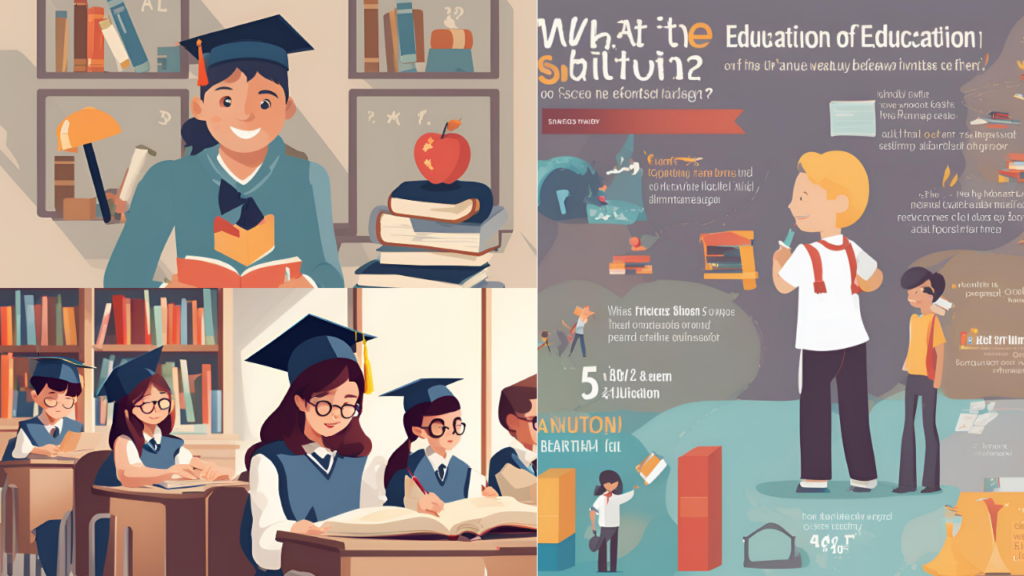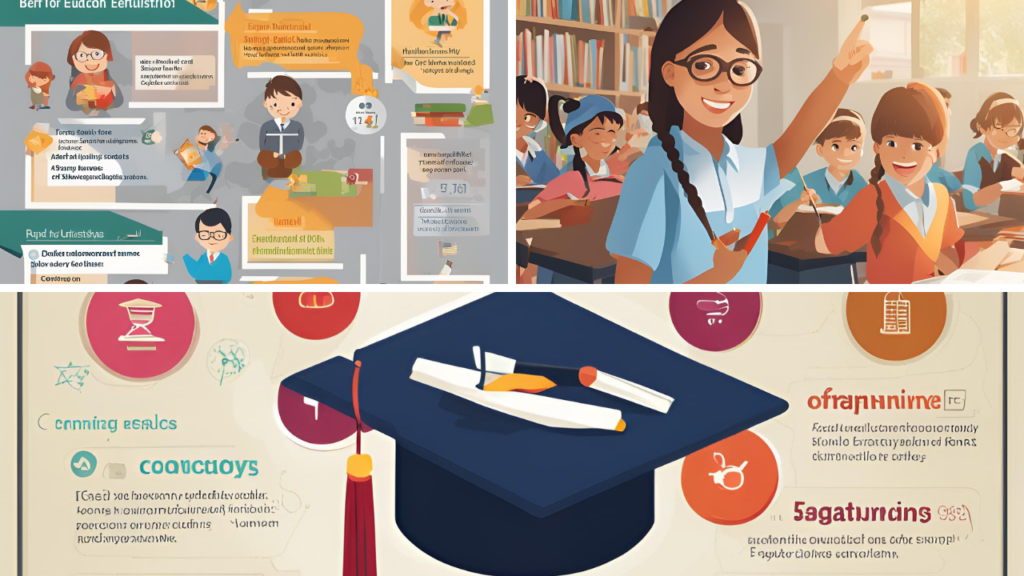Table of Contents
1Introduction
– Definition of education
– Importance of education in modern society
2Types of Education
– Formal education
– Informal education
– Non-formal education
– Special education
3Academic Benefits
– Cognitive development
– Critical thinking skills
– Problem-solving abilities
– Knowledge acquisition

4Personal Development
– Self-awareness
– Emotional intelligence
– Confidence and self-esteem
– Time management skills
5Social Benefits
– Communication skills
– Teamwork and collaboration
– Cultural awareness and tolerance
– Civic participation
6Economic Benefits
– Higher earning potential
– Employment opportunities
– Economic growth and development
– Innovation and entrepreneurship
7Health Benefits
– Physical health
– Mental health
– Health literacy
– Healthy lifestyle choices
8Technological Literacy
– Understanding and using technology
– Preparing for a digital world
– Innovation and adaptability
– Cybersecurity awareness
9Environmental Awareness
– Understanding environmental issues
– Sustainable living practices
– Advocacy for environmental protection
– Participation in conservation efforts
10Global Perspective
– Understanding global issues
– Promoting peace and security
– Cultural exchange and global citizenship
– Preparing for global challenges

11Family Benefits
– Parenting skills
– Support for children’s education
– Family cohesion
– Financial stability
12Community Benefits
– Community development
– Social cohesion
– Volunteerism and service
– Community leadership
13Case Studies
– Impact of education in different countries
– Personal stories of educational success
– Examples of community transformation through education
14Challenges in Education
– Accessibility and inequality
– Funding and resources
– Quality of education
– Adapting to change
15Future of Education
– Technological advancements
– Personalized learning
– Lifelong learning
– Global educational initiatives
16Conclusion
– Summary of key points
– Call to action for furthering education
Article
Introduction
Education is a transformative journey that encompasses the acquisition of knowledge, skills, values, beliefs, and habits. It is a lifelong process that begins at birth and continues throughout life, significantly shaping an individual’s personal, social, and economic well-being. In today’s fast-paced and interconnected world, the importance of education cannot be overstated. It serves as a cornerstone for personal growth, social development, and economic progress, making it a vital component of a thriving society.
Types of Education
Formal Education
Formal education refers to the structured and systematic form of learning that takes place in educational institutions such as schools, colleges, and universities. It follows a set curriculum and is often guided by professional educators. This type of education is divided into various stages, including primary, secondary, and tertiary education, each designed to build on the knowledge and skills acquired in the previous stage.
Informal Education
Informal education occurs outside of the traditional classroom setting and is not confined to a specific curriculum. It includes learning from family members, peers, media, and everyday experiences. Informal education is continuous and often spontaneous, contributing significantly to an individual’s overall development and lifelong learning.

Non-formal Education
Non-formal education refers to organized educational activities that do not fit within the formal education system but are still intentional and structured. Examples include adult education programs, community education, and online courses. Non-formal education is flexible and can be tailored to meet the needs of learners of all ages.
Special Education
Special education is designed to address the unique needs of individuals with disabilities or special learning requirements. It provides tailored instruction, support services, and resources to help these individuals achieve their full potential. Special education encompasses a wide range of conditions, including physical, intellectual, and emotional disabilities.
Academic Benefits
Cognitive Development
Education plays a crucial role in cognitive development, enhancing the brain’s capacity to process information, think critically, and solve problems. Through exposure to various subjects and disciplines, individuals develop a deeper understanding of the world and their place in it.
Critical Thinking Skills
One of the core benefits of education is the development of critical thinking skills. Education encourages individuals to question assumptions, analyze information objectively, and make reasoned decisions. These skills are essential for navigating the complexities of modern life and contributing to informed societal discourse.
Problem-Solving Abilities
Education equips individuals with the tools needed to identify, analyze, and solve problems effectively. Whether in academic settings or real-world situations, the ability to approach challenges with a systematic and logical mindset is invaluable.
Knowledge Acquisition
Education facilitates the acquisition of a vast array of knowledge across different fields. This knowledge base enables individuals to understand and engage with the world around them, fostering intellectual curiosity and a lifelong love of learning.
Personal Development
Self-Awareness
Education fosters self-awareness, helping individuals understand their strengths, weaknesses, values, and motivations. This self-knowledge is crucial for personal growth and achieving one’s goals.
Emotional Intelligence
Through interactions with peers and educators, individuals develop emotional intelligence, which includes the ability to recognize, understand, and manage one’s own emotions and the emotions of others. Emotional intelligence is key to building healthy relationships and achieving personal and professional success.
Confidence and Self-Esteem
Educational achievements contribute to an individual’s confidence and self-esteem. The sense of accomplishment that comes from mastering new skills and knowledge boosts self-belief and encourages further pursuit of learning and personal goals.
Time Management Skills
Education teaches essential time management skills, enabling individuals to prioritize tasks, set goals, and meet deadlines. These skills are critical for academic success and are transferable to various aspects of life, including work and personal endeavors.
Social Benefits
Communication Skills
Education enhances communication skills, both verbal and written. Effective communication is essential for personal and professional interactions, allowing individuals to express their ideas clearly and persuasively.
Teamwork and Collaboration
Educational settings provide opportunities for teamwork and collaboration, fostering the ability to work effectively with others towards a common goal. These skills are vital in both academic and professional environments.
Cultural Awareness and Tolerance
Education exposes individuals to diverse cultures, perspectives, and experiences, promoting cultural awareness and tolerance. This understanding is essential for building inclusive societies and fostering global cooperation.
Civic Participation
An educated populace is more likely to engage in civic activities, such as voting, volunteering, and community service. Education instills a sense of civic responsibility and empowers individuals to contribute to the betterment of society.

Economic Benefits
Higher Earning Potential
Education is closely linked to higher earning potential. Individuals with higher levels of education typically earn more than those with lower levels of education, leading to greater financial stability and improved quality of life.
Employment Opportunities
Education opens doors to a wide range of employment opportunities. Employers often seek individuals with specific educational qualifications, and higher education levels can lead to better job prospects and career advancement.
Economic Growth and Development
Education is a key driver of economic growth and development. An educated workforce is more productive, innovative, and capable of driving technological advancements and economic progress.
Innovation and Entrepreneurship
Education fosters innovation and entrepreneurship by equipping individuals with the knowledge and skills needed to create and implement new ideas. Educated individuals are more likely to start businesses, contribute to economic diversification, and drive societal progress.
Health Benefits
Physical Health
Education is linked to better physical health outcomes. Educated individuals are more likely to engage in healthy behaviors, such as regular exercise and proper nutrition, and are less likely to engage in risky behaviors, such as smoking and substance abuse.
Mental Health
Education contributes to improved mental health by providing individuals with the tools to cope with stress, build resilience, and seek help when needed. Education also reduces the stigma associated with mental health issues and promotes a supportive environment for those affected.
Health Literacy
Education enhances health literacy, enabling individuals to understand and make informed decisions about their health and healthcare. This includes understanding medical instructions, navigating the healthcare system, and advocating for one’s own health needs.
Healthy Lifestyle Choices
Educated individuals are more likely to make informed and healthy lifestyle choices. This includes decisions related to diet, exercise, preventive care, and overall well-being, leading to a higher quality of life and reduced healthcare costs.
Technological Literacy
Understanding and Using Technology
In today’s digital age, technological literacy is essential. Education equips individuals with the skills needed to understand and use technology effectively, from basic computer skills to advanced technical knowledge.
Preparing for a Digital World
Education prepares individuals for the digital world by teaching them how to navigate and thrive in a technology-driven society. This includes understanding digital tools, online communication, and the ethical implications of technology use.
Innovation and Adaptability
Education fosters innovation and adaptability by encouraging individuals to embrace new technologies and adapt to changing environments. These skills are crucial for staying competitive in the rapidly evolving job market.
Cybersecurity Awareness
Education plays a vital role in promoting cybersecurity awareness. Educated individuals are better equipped to protect themselves from cyber threats, understand the importance of data privacy, and practice safe online behavior.
Environmental Awareness
Understanding Environmental Issues
Education raises awareness of environmental issues, such as climate change, pollution, and biodiversity loss. This knowledge is essential for fostering a sense of responsibility towards the environment and promoting sustainable practices.
Sustainable Living Practices
Education encourages sustainable living practices, such as reducing waste, conserving energy, and supporting eco-friendly products. These practices contribute to environmental conservation and the long-term health of the planet.


